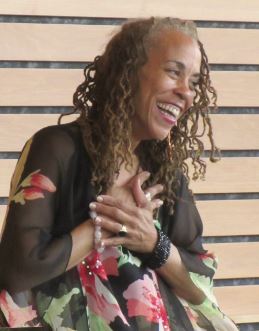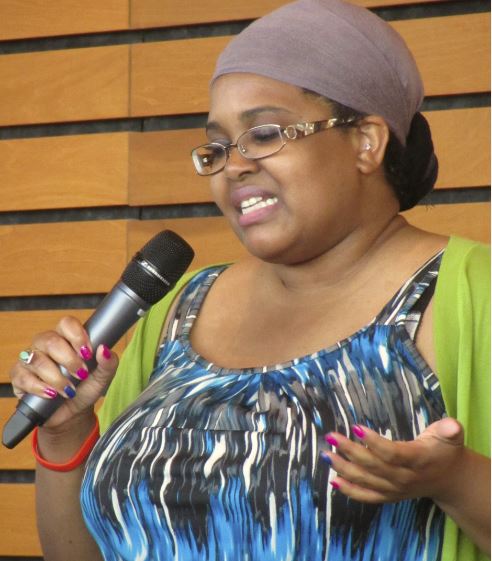Correspondence from a reader on the Chicago BA Everywhere Fundraiser
"To Our Future's Brighter Day"—
Maggie Brown's LEGACY: Our Wealth of Music
June 9, 2014 | Revolution Newspaper | revcom.us
We received this correspondence from a reader about the successful benefit for Chicago BA Everywhere with the Chicago singer/storyteller Maggie Brown performing her one-woman show, Legacy: Our Wealth of Music, a short clip from STEPPING INTO THE FUTURE; On the Occasion of the Publication of BAsics: A Celebration of Revolution and the Vision of a New World and a reading from a prisoner’s letter about revolution.
* * *
Sunday afternoon, June 1, 2014, the rooftop chapel/auditorium at the beautiful and newly built Chicago Theological Seminary in Hyde Park, enjoyed a large audience in a benefit for ‘BA Everywhere’. The Chicago singer/storyteller, Maggie Brown performed her one-woman show, Legacy: Our Wealth of Music.
This show is an encapsulated history of Black American music and culture, specifically in the United States. As a monologue in words and music, Maggie shared everything from stories, to old spirituals, gospel tunes as well as originally composed material, interspersed with political and social commentary, while interacting with the audience whenever possible.

Maggie Brown
The program began with call and response, the traditional, antiphonal group vocal technique used by slaves in the cotton fields and still employed by many modern Black Gospel churches. Spirituals, such as Wade in da Water, are antecedents to ragtime and modern rhythmic jazz. From there, Maggie took the audience on a brief tour of that genre, specifically the music of legendary genius composer/pianist, Scott Joplin.
In between these musical examples, Maggie interspersed critical and historical commentary about culture, Black and otherwise. For example, Scott Joplin’s publishers and subsequent pianist imitators enjoyed fabulous notoriety and wealth while Joplin died largely penniless and in an unmarked grave; a latter day Mozart of sorts. As an aside, this grim scenario would repeat itself throughout the years as numerous jazz and blues musicians found their music appropriated by Elvis Presley, Bill Haley and other popular rock stars.
And Maggie is never shy or too politically correct to inject some witty, razor sharp invective about modern Black commercial artists, including Rihanna, Beyonce, gangsta rappers and the commodification of these personalities for corporate profits, even when the result is violence, sexism or misogyny which keeps us divided amongst ourselves. This reviewer specifically admired how Maggie served as a vehicle for the word and song she represented without casting the entire spotlight on herself ala many popular self-billed ‘divas’. The audience appreciated it as well, giving her three well-deserved ovations.
Due to obvious time constraints, Maggie’s program abruptly fast forwards to bebop, modern Jazz and a bit of rap, a reminder of how vast the scope of Black American music is and how immeasurable is its contribution to world culture. One cannot help but note that even a program three times in length would just begin to scratch the surface.

Reading of a Prisoner Letter,
Benefit for BA Everywhere, Chicago,2014.
Still, Maggie tackled a lot in about an hour’s time. One of the key reasons for the program was to remind the audience about the problems of the world: imperialistic wars, millions of imprisoned Black and Latino youth, poverty, despair and the need for a radically different world. Prior to the performance, a short clip of Stepping into the Future, featuring Ms. Brown’s lively contribution to that Harlem event, was shown. Additionally, a supporter of PRLF read from a prisoner’s letter after the performance.
In her program notes, Maggie writes: “What if the words we say led to a better way of being certain of our future’s brighter day? My people – that’s what’s to talk about today!”, and “Those are my words – and when I learned of BA Everywhere, I felt like what he is laying out is just what needs to be not just talked about but acted on.”
Perhaps if we had a radically different world, enlightening programs such as these would not be limited to a rooftop chapel at a theological seminary for a mere hundred or so attendees, but in public squares and parks shared by thousands of people. We’d be talking and mixing it up amongst ourselves. We’d be singing and dancing and participating and not just plugged into our sound devices as spectators and consumers of music. Maggie Brown’s witness and artistic energy give us a small but powerful glimpse of what that Revolution could really mean!
mbh, Chicago
Donate to radically change the world.
DONATE to the BA Everywhere Campaign!
If you like this article, subscribe, donate to and sustain Revolution newspaper.
